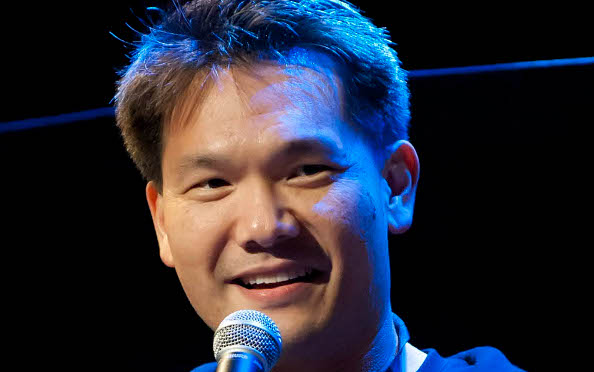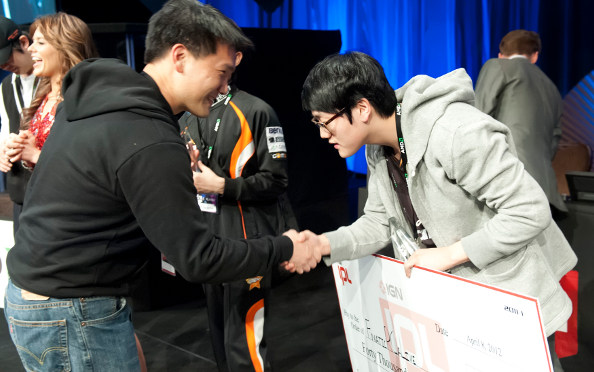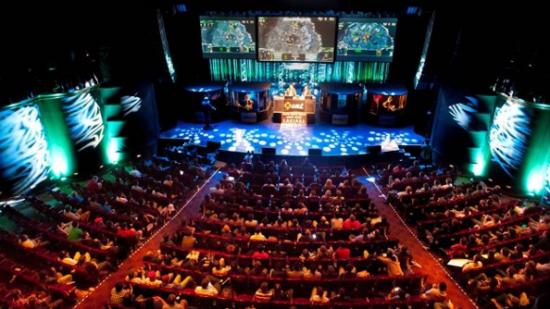In the world David Ting envisions, kids don’t just play soccer and basketball on their school playground, or talk about last night’s hockey game at lunch. They talk about last night’s StarCraft match, and describe their favorite strategies for Call of Duty or Street Fighter. They’re not nerds or geeks or any other label you care to slap on them, they’re just kids who love sports.
And when they’re older and they decide they might want eSports to be their career, nobody thinks they’re crazy or wasting their time. Top amateurs will be able to attend training camps where older pros can mentor them and they can get funding to start attending events on the professional circuits. If they can’t quite play well enough to make it in the pros, they can become eSports writers and reports, and commentators.
That’s what Ting wants the future to bring. But first, he’s got to win over gamers.
“If you went back in time a hundred years, and you have an opportunity to create a sports league, would it basically cover all sports? Football, basketball, baseball, etc. etc., and create the economy of scale that applies to all these sports? So my vision is exactly that.”
Ting is IGN’s General Manager of eSports and VP of Research and Development, overseeing the IGN Pro League and building it toward far more ambitious goals. We spoke to him this week about his plans for growing eSports and IPL, and what keeps the majority of the videogame audience from embracing eSports.
“People actually look at this problem too small, they look at it from a video game perspective or an eSports perspective. The revolution that I’m asking – and this is part of my business plan, I’m actually a bold thinker, and you can call me a crazy thinker as well – but I believe what e-commerce has done with traditional brick and mortar stores can actually happen if you actually do eSports right.”
Ting explains that if you were to do eSports right, they do away with most of the limitations facing traditional sports. You have players that aren’t limited by factors like injury, or weather, or salary caps. You can just build an infrastructure and production pipeline that means eSports could be available and accessible 24 / 7, around the world.
“It’s naturally going to push the water cooler talk, in my lifetime, where instead of talking about soccer or football here in the UK, or American football at the water cooler in the States, you’ll be actually talking about Call of Duty, or Street Fighter and this kid from Africa, or this kid from Russia that made it all the way, did some upset, and became the star. That’s the stuff I really want to do.”

But Ting also thinks eSports are being held back a bit by the limited appeal of the games that have defined them so far, and a corresponding lack of imagination about what eSports could be.
“Gaming is such a rich universe where you’re telling a story, you can enact battles, you can basically be placed in a fantasy world, there’s so many ways that we could be doing eSports that basically set the environment outside of sports,” he explains. “…It’s a tried and true system, but the key here is that there’s a lot of things on the videogaming side that people are not bringing in to really help, to broaden the appeal for eSports.”
One sign of how far eSports have to go is how hostile the traditional videogame audience often is to eSports. Whenever you find eSports coverage popping up alongside traditional games coverage like reviews and previews, you’re almost certain to find a nasty backlash for gamers against eSports, the people who watch them, and the very idea of dedicating coverage to them.
It’s a particular concern for Ting because he acknowledges that IPL is itself a guinea pig within the world’s largest gaming site, IGN. One of the unfortunate ironies facing the IPL at the moment is that IGN itself devotes scant resources to covering eSports, including a league that is technically part of the same organization.
Ting is trying to bring IGN editorial around to the cause, but he thinks there are things he can do it IPL, and that eSports as a whole could do, to garner more mainstream attention and acceptance.

“The biggest issue is the games,” he argues. “The most successful games right now are StarCraft II and League of Legends and if you look at gaming site-wide, I don’t know if those are the biggest titles that people talk about, and I think that’s the biggest problem.”
Games like ShootMania, which will have a $100,000 tournament at IPL 5 in Las Vegas at the very end of November, could offer a possible solution. He explains that while people might think the ShootMania tournament is pure marketing from Ubisoft, the truth is that the IPL approached Ubisoft about the game and is putting up half the money for the prize pool because they believe in the game. A few of Ting’s colleagues were a part of the ShootMania alpha and became convinced that it would make for a great eSports event.
“What I like about the game is, one, that it’s a very pure first-person shooter, so it’s very much like Quake,” Ting says. “Second, is it has a toolkit to basically allow you to customise a map. It’s extremely programmable, so that is something that is again very important for me. …You want to use technology as a paradigm, so you have to add a lot of innovations to it. With Shootmania we believe that having a user-generated map, maps that pros haven’t seen in a competition, would add a lot of excitement and dynamics.”
Ting compares that to the situations with CS:GO or Team Fortress 2, where growth is slow and the competitive community is struggling. While those might be viable eSports and proven competitive shooters, those aren’t the stakes Ting is playing for.
“We’d rather take a risk and do something that’s completely different, something that could be completely a failure, at the same time it could be a huge success, like Minecraft. Like when Minecraft first stated, people looked at it and said ‘What is this game?’ Right? And we want to be part of a future Minecraft.”
For now, the IPL is striking a balance between proven eSport successes like League of Legends and StarCraft 2 and potential contenders like ShootMania. IPL 5 will, on the one hand, host the ShootMania tournament while also welcoming the GSL for its Season 4 Code S semifrinals and finals. In the pro StarCraft world, it does not get any more prestigious than that.
But Ting thinks IPL can be something more than a tournament organizer. It can be a community organizer, building infrastructure to help grow eSports and to make it a more welcoming place for the next generation of pros.
“Basketball does it really right in the states. I don’t know if you’re aware, a lot of the top NBA stars will have like the Michael Jordan summer camp. …That’s basically the vision, to fund those summer camps. It’s really setting up video gaming diversity. One of our mission statements is to be the Ivy League of video gaming, for eSports, and really coaching people how to play right.”
But before Ting can pursue that dream, he’s got to deal with the here and now. He wants IGN / IPL to lay the groundwork for an effective amateur-to-pro pipeline by creating a huge knowledge base that aspiring competitive players could use to improve their skills and arrive at a deeper understanding of the games themselves.
Ting knows some of his ideas seem a little outlandish, and he’s no stranger to having his bosses tell him he’s out of his mind. He knows there are some arguments he’ll never win, and he’s fine with that.
“Arguing in a room just leads you nowhere,” he says. “That’s why I sat down and wrote the eSports business plan. It’s really about doing instead of debating. I could’ve sat in a conference room and given in, or continued the debate, which is not healthy. [Or I could] try to show there’s a way to do it as part of IGN, and just show this new vision.”
IPL 5 takes place on 29th November, at the Cosmopolitan Hotel in Las Vegas. It willbe streamed online.
Photo credit, above: Oliver Yu, courtesy IGN
